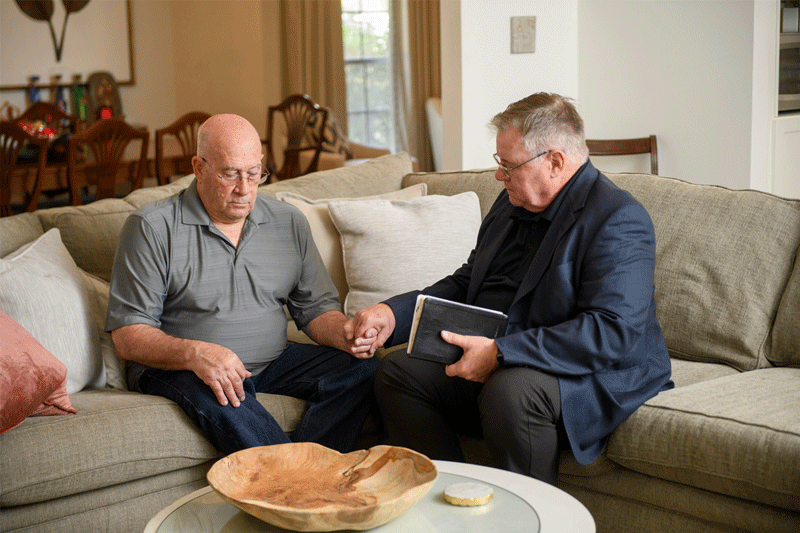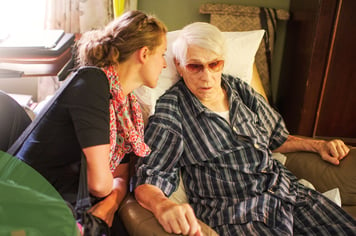Moments in life define our stories, not by how they weakened us, but how we overcame them. However, the story must be lived and completed in order to be told. These journeys have the power to become debilitating, directly affecting personal health, the immune system, finances, diet, energy levels, emotional health and the work/life balance.
Each stressor and its subcomponents create a withdrawal from the internal energy bank, making the pathway to restoration longer and more difficult. It is easy to become lost in the worries, stressors, past events, needs, financial requirements and “what-ifs.” However, implementing daily wellness strategies creates health, strength, the capacity to problem solve and resiliency.
An example of a major stressor is working while caring for a loved one. AARP identifies that there are 40 million people taking care of family members, giving 20 or more hours per week. Many family members are still working while providing care, often living in different geographical areas. Navigating the stress while caring for a loved one has a direct impact on finances, health, personal time, spirituality and sense of self. It is not uncommon for life outside of the stressor to become neglected and out of control.
The following are strategies and tactics offered by the professional caregivers of the Amedisys Hospice team in Roanoke, Virginia, many of them are personal caregivers themselves.
Get Up
- Make your bed - U.S. Navy Adm. William H. McCraven recommends making the bed every day. It accomplishes the first task of the day, promoting a sense of pride and accomplishment; motivating additional tasks to be completed. It reinforces that little things matter. If the day was miserable, coming home to a bed made by you provides encouragement that tomorrow will be better.
- Structure a regular routine as much as possible get up and go to bed at the same time
- Set small, achievable goals. Create a sense of accomplishment and self-worth.
[action 1]
Stay Present
- Daily Prayer/ Meditation - Chaplain Troy Mays recommends prayer and meditation throughout the day; placing words of encouragement in visible areas for reminders of hope and strength. Simply put, “God is not I was. God is not I will be. God is I am.”
- Gratitude – Practice daily gratitude. A simple exercise can be identifying five things every day that bring a feeling of thankfulness. Gratitude changes brain chemistry, releases endorphins and the feel- good chemical, dopamine.
- Use the 15-minute rule. Recommended by the Arthritis Foundation: Most tasks can be completed in about 15-minutes, including exercise and journaling. Adopting this strategy to perform a task and then take a break decreases anxiety and promotes a sense of accomplishment.
- Use of a planner or a calendar maintains organization when the brain is frazzled.
Recharge
- Take a Drive - Tia Murdock, LPN, who is also a family caregiver, identified that a long drive with your favorite music can greatly renew her spirit.
- Read a Book or Garden-Jewel Woods, LPN, Clinical Manager Assistant, is a family caregiver and active grandmother of a newborn and toddler. She cherishes those moments with the children and quiet moments with a great book or in a garden.
- Exercise - Regular exercise, even 15-20 minutes of easy walking, has dramatic effects on reducing stress, promoting feelings of happiness and assisting with problem-solving.
- Journal- Spend time writing your thoughts and knowing what you want, feel and need. Clarity of purpose and mission can go a long way to feeling renewed.
Create a Support System
- You are not alone - Everyone has a story. Break the internal barrier and share the story. Once shared, the pain is not as intense and there are shoulders to cry on.
- Build Your System- Chaplain Candy Tharpe builds support systems within the framework of Amedisys Hospice, within the community and by making connections on social media. The goal is to find a support network that allows for a safe place for expression. Support systems can be found within church communities, a support group, a social network site, work or recreational groups or a professional counselor.
- Ask for Help – Each of us has strengths. It is difficult and humbling to acknowledge the limitations that we also have. When the situation is addressed from multiple perspectives, many stressors are alleviated because the strength of many are utilized.
Keep the Faith
- “If you have faith the size of a mustard seed, nothing is impossible.”
- Continue Faith Celebrations/Rituals- Life events often challenge or strengthen our faith. For Bereavement Coordinator/Social Worker, Shelley Gillis, who is also a family caregiver, she identifies that faith strengthens her and supports her even when days are challenging. Finding ways to be involved in celebrations of faith could be meditation, daily scripture readings, music, or opportunities to worship with the church community.
Keep it Simple
- Unplug – spend time without electronics. Remove them from the bedroom. Turn off the phone. Spend only a limited amount of time on the social media sites.
- Spend time outdoors.
- Feed the body good food and water- Limit the processed, high fat and sugared foods. Add more water to the diet while limits soda, alcohol, and caffeine. Enjoy the fresh fruits and vegetables. Add a multi-vitamin and a b-complex vitamin in the morning to assist with regulating metabolism and sleep.
- Listen to music - it restores the soul.
Every challenge, difficulty, and situation eventually pass. Personal perception is a great strength to managing the present and preparing for the future. During times of struggle, remember, “You are braver than you believe. Stronger than you seem. Smarter than you think and loved more than you know.” (A.A. Milne)
Special thanks to the Amedisys Hospice team in Roanoke, Virginia for sharing their strategies of being okay when life is not okay.
Resources:
A.A.Milne, Winnie, The Pooh. 1926
https://www.aarp.org/caregiving/home-care/info-2018/millennial-caregivers-work-life.html
Arthritis Foundation: Take Control. We Can Help. Trainer’s Manual, 2009, 2005, Arthritis Foundation, GA
https://www.mayoclinic.org/diseases-conditions/depression/in-depth/depression-and-exercise/art-20046495



.png?width=356&height=237&name=iStock-477742824_edited%20(002).png)